India is the world’s largest democracy, but it is also a very unequal country, where some citizens are more equal than others. Convicted criminals, who are rich and powerful, seem to get out of jail well before their sentences have been completed. This is in sharp contrast to the lives of thousands of under trails languishing in jails not having access to a lawyer or even getting a chance for a fair trial. However, in the darkened “Halls of Cinema”, Good always wins over Evil and the Long Arm of the Law would eventually catch up with the criminals.
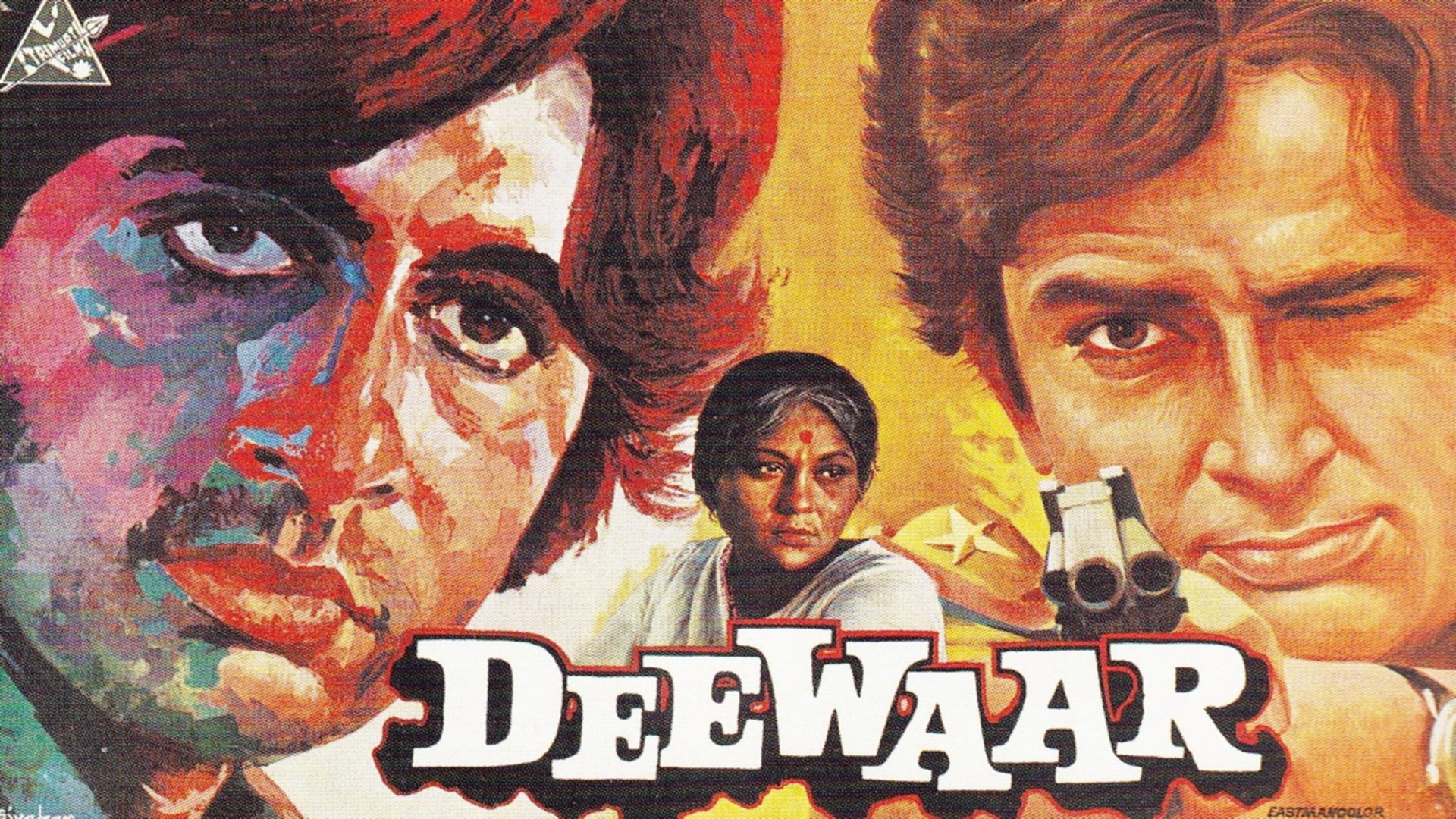
How does the film industry view crime and punishment? How do they represent it in their work? How do they deal with the law when one of their own is the accused?
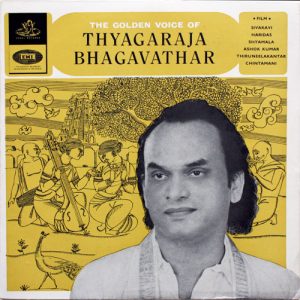 The first major criminal story to rock the Indian film industry was the Lakshmikanthan murder case in 1944. A film journalist, Lakshmikanthan wrote salacious articles about film actors in a magazine called Hindu Nesan. The journalist was murdered by a group of assailants, who claimed it was under the orders of a few famous people, namely MK Thyagaraja Bagavathar, one of the most famous singing stars of Cinema and Comedian N S Krishnan. Back then, ‘Quotation’ was not the preferred word for a hired goon. The murder and subsequent trail happened during the last days of the British Raj and the Tamil film industry was actively involved in the freedom struggle. Both, MK Thyagaraja Bhagavathar and NK Krishnan, were convicted and went to prison for thirty months.
The first major criminal story to rock the Indian film industry was the Lakshmikanthan murder case in 1944. A film journalist, Lakshmikanthan wrote salacious articles about film actors in a magazine called Hindu Nesan. The journalist was murdered by a group of assailants, who claimed it was under the orders of a few famous people, namely MK Thyagaraja Bagavathar, one of the most famous singing stars of Cinema and Comedian N S Krishnan. Back then, ‘Quotation’ was not the preferred word for a hired goon. The murder and subsequent trail happened during the last days of the British Raj and the Tamil film industry was actively involved in the freedom struggle. Both, MK Thyagaraja Bhagavathar and NK Krishnan, were convicted and went to prison for thirty months.
There was a huge uproar. Some sections of the media reported that the case had several loopholes. The famous lawyer D N Pritt argued for them in the Privy Council in London and they were acquitted.
The arrest adversely affected MK Thyagaraja Bagavathar’s career. The singing star of the mythological films was at sea when he was asked to mouth loud melodramatic dialogues in family dramas.
There was also an unseen force working against MK Thyagaraja Bagavathar. He chose not to align himself with a new breed of screenwriters, who were atheists, and would later lead the Dravidian political parties. Bagavathar chose God and Bhakti. He had no supporters in the changed film industry and his attempts at making a comeback were a disaster. Having lost his fame and fortune, he had to make ends meet singing devotional concerts in small temple towns until the very end of his life.
N S Krishnan fared a little better because of his political choice of backing the Dravidian movement but he, too, could never gain the kind of fame he once possessed.
Does the real life image of the actor affect his onscreen persona? Has the concept of crime and punishment changed in India?
How do the film industry, the judiciary, the media and public opinion react when famous actors are involved in a crime? Well, a lot has changed in seventy years.
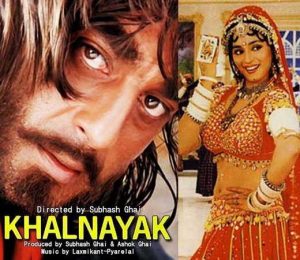 The son of Nargis and Sunil Dutt, Sanjay Dutt, had a dream debut in Hindi cinema with Rocky in 1982. He was all set to be part of the privileged set of Bollywood star sons, born to rule the roost. Sanjay Dutt had his fair share of trouble with drugs and erratic behavior but eventually turned to body building and fitness. In 1993, just before the release of his big hit Khalnayak, he was arrested for his alleged involvement with terrorism in the Mumbai bombings. Even his father Sunil Dutt, a veteran congress politician, was unable to rescue him. Sanjay was not to act for the next four years due to his subsequent arrest and bails.
The son of Nargis and Sunil Dutt, Sanjay Dutt, had a dream debut in Hindi cinema with Rocky in 1982. He was all set to be part of the privileged set of Bollywood star sons, born to rule the roost. Sanjay Dutt had his fair share of trouble with drugs and erratic behavior but eventually turned to body building and fitness. In 1993, just before the release of his big hit Khalnayak, he was arrested for his alleged involvement with terrorism in the Mumbai bombings. Even his father Sunil Dutt, a veteran congress politician, was unable to rescue him. Sanjay was not to act for the next four years due to his subsequent arrest and bails.
His resurrection had started while doing the Munnabhai MBBS films and by playing Lage Raho Munna Bhai, the audiences seem to have exonerated him.
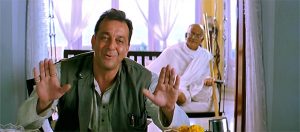 Did the Gandhian pacifist message in Lage Raho Munna Bhai, give him a khadi makeover from AK47s and drugs? Not really. He had to go back to prison and now his Biopic featuring the young Ranbir Kapoor, playing the lead, is hot property in Bollywood. Meanwhile Sanjay Dutt waits for a role to change his fortunes again. Recently there have been calls for Sanjay Dutt to be sent back to prison to serve his remaining Jail term. Will a nationalist wash save him this time?
Did the Gandhian pacifist message in Lage Raho Munna Bhai, give him a khadi makeover from AK47s and drugs? Not really. He had to go back to prison and now his Biopic featuring the young Ranbir Kapoor, playing the lead, is hot property in Bollywood. Meanwhile Sanjay Dutt waits for a role to change his fortunes again. Recently there have been calls for Sanjay Dutt to be sent back to prison to serve his remaining Jail term. Will a nationalist wash save him this time?
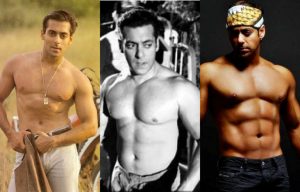 In 1993, the original bad boy of Bollywood, Salman Khan, who was an understudy to Sunjay Dutt in bodybuilding and steroid pumped machismo was arrested for shooting black bucks and a Chinkara.
In 1993, the original bad boy of Bollywood, Salman Khan, who was an understudy to Sunjay Dutt in bodybuilding and steroid pumped machismo was arrested for shooting black bucks and a Chinkara.
In 2002, he was arrested for drunk driving his SUV, killing one person and injuring four others sleeping on the pavement in Bandra, Mumbai.
In the interim period Salman Khan’s stock rose, he played the famous Police officer Chulbul Pandey in Dabbang. His father Salim Khan urged his Muslim brethren to support a Hindu national party in the then upcoming elections. In Bajrangi Bhaijaan, Salman played an innocent hanuman bhakt, Pavan, who returned a cute deaf mute girl Munni to Pakistan. The message was clear – the great nation of India will only do good to its terror sponsoring neighbours.
Seventeen years later, Salman was acquitted of all charges, the court found that stray dogs killed the black bucks and he was not behind the wheel of his SUV. Salman was pure and innocent as his characters; he was given a saffron wash.
Deewar, a crime drama written by Salim (father of Salman) & Javed, directed by Yash Chopra in 1975, dealt with the ethical and moral conflict of brothers – an honest police officer and a criminal. The victor was eventually the police officer. When the rich successful criminal brother boasts that he has everything in the world – money, cars, buildings, the proud upright officer rebuts but I have our mother. The message was simple – even the mother’s affection could not wash off the sins of crime.
 In 1972, Francis Ford Coppola made Godfather, a modern Hollywood classic. This film made the word mafia acceptable on dinner tables. Every kid had learnt of the code of honour and loyalty that ran within the Cosa Nostra.
In 1972, Francis Ford Coppola made Godfather, a modern Hollywood classic. This film made the word mafia acceptable on dinner tables. Every kid had learnt of the code of honour and loyalty that ran within the Cosa Nostra.
India, too, was influenced by this wave. In the eighties, Nayakan, a Tamil film based on the life an underworld don, Varadaraj Mudaliar, directed by Mani Ratnam, catapulted him and the lead actor to critical acclaim worldwide. However, in the end of the film, the protagonist, Velu Nayakan, was shot and killed by a mentally retarded child of the police officer whom he had killed earlier. Justice was served not by the police force but by the hands of an innocent child.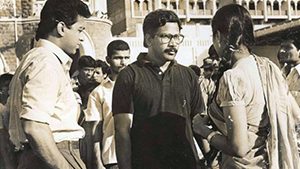
In the nineties too, crime didn’t give you happiness, even if it was getting sexier. Satya directed by Ram Gopal Verma, created new genre called the Mumbai noir. Here too, the anti-hero Satya was shot dead on the doorstep of his lover Vidya’s house.
As more and more actors get acquitted from serious crime, the idea of jurisprudence is getting questioned. The filmmakers’ voice and the audiences’ taste also seem to be changing.
The era of cinema being a moral compass of society is over. It has slowly been replaced by cinema that is now a reflection of the world we live in.
 In the recent hit Tamil film, Vikram and Vedha written and directed by Pushkar and Gayatri, the encounter cop, Vikram, is entrusted with the task of killing a criminal, Veda. Vikram, played by Madhavan, ends up getting sucked into the strange world of storytelling of Veda played by Vijay Sethupathi, and questions our notions of right and wrong. Vikram finally ends up shooting the corrupt policemen and the film ends with Vikram and Veda surviving the shootout and becoming the cop and the buddy.
In the recent hit Tamil film, Vikram and Vedha written and directed by Pushkar and Gayatri, the encounter cop, Vikram, is entrusted with the task of killing a criminal, Veda. Vikram, played by Madhavan, ends up getting sucked into the strange world of storytelling of Veda played by Vijay Sethupathi, and questions our notions of right and wrong. Vikram finally ends up shooting the corrupt policemen and the film ends with Vikram and Veda surviving the shootout and becoming the cop and the buddy.
The lines between right and wrong, good and evil are getting blurred.
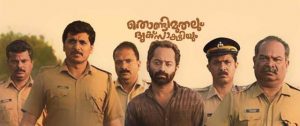 In Thondimuthalum Driksakshiyum, a Malayalam film, directed by Dileesh Pothan, a newly married couple travel in a bus in North Kerala. The heroine’s chain is snatched by a thief, the protagonist of the film, played by Fahad Fazil. The thief is caught, but the chain is missing. The bus-load of passengers arrive at the police station to handover the suspect to the police. This is where most films ended in the past. The criminal is caught and law would take its course and the audience could go home satisfied that justice has prevailed.
In Thondimuthalum Driksakshiyum, a Malayalam film, directed by Dileesh Pothan, a newly married couple travel in a bus in North Kerala. The heroine’s chain is snatched by a thief, the protagonist of the film, played by Fahad Fazil. The thief is caught, but the chain is missing. The bus-load of passengers arrive at the police station to handover the suspect to the police. This is where most films ended in the past. The criminal is caught and law would take its course and the audience could go home satisfied that justice has prevailed.
However, this film is made in 2017. It takes us into the bizarre world of a small rural Police station, bumbling, fumbling ageing policemen, the duplicity and ethical dilemma of the law enforcer, the struggle of an ordinary citizen hoping for justice and the casual indifference of the criminal. The judiciary is totally absent in this crime saga. The role of judges handing over death sentences seems passé, in the era of encounter killings.
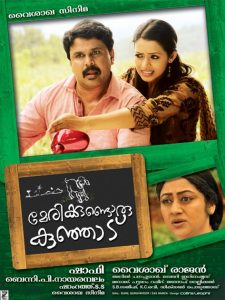 Out of the darkened theatre, into the glaring Kerala sun another saga is playing out on TV. Audiences are riveted to the real life sleaze and crime drama in which TRPs are zooming for the news channels.
Out of the darkened theatre, into the glaring Kerala sun another saga is playing out on TV. Audiences are riveted to the real life sleaze and crime drama in which TRPs are zooming for the news channels.
Dileep, a leading actor of Malayalam cinema, has been arrested for allegedly organising the abduction and assault of an actress. The actress had apparently squealed on Dileep having an affair with another actress to his then wife. The infuriated actor is alleged to have hatched a conspiracy and a Quotation was allegedly paid for a crime to be committed four years later.
This was a crime not against some yellow journalist or some poor black buck. It was a crime against a woman on the busy street of Kochi, in India’s most literate state.
The Chief Minister of Kerala and the film industry who had asked for a media closure of the case, have done a U-turn and called for his conviction. The television anchors have passed judgement, Dileep has been sentenced on prime time, booed in public and his restaurants attacked but will the evidence hold in court?
Will Dileep be acquitted? Will he resurface and become the superstar again or will he suffer the fate of M K Thyagaraja Bagavathar? Only time will tell. Whatever his legal team does, he better get hold of some political party and give himself a white wash to change his image. For even in our morally agnostic times, the hero of the silver screen is always the ones who saves the woman and the oppressed from the evil and powerful forces.
– Rajiv Menon

Very nicely written
I enjoyed the candid comments written with sense and sensibility style Rajeev. Thought provoking and informative analysis of evolving indian mindsets via cinema, thanks for writing this piece. I saw the kandukondein kandukondein glimpses in the Emma Thomson Kate Winslet Hugh Grant starter on an A380 screen yesterday and admired your deft ability to adapt it seamlessly to the Indian ethos. Make more films. Write even more. Speak most. India needs voices like yours for national advancement.
Well written, thought provoking
That was bold, thought-provoking and frank, Rajiv! You have raised pertinent questions that need to be addressed however uncomfortable it may sound.
Brilliant and simply put, proving the adage that one can get away with murder (too) as long as one knows the right people. Sallu’s acquittal brought the judiciary to a historic low…
What a commentary on society, films and media! Brilliantly written
Why don’t you script a bio pic of MKT Bhagavatar’s life. It will be most rivetting. Did you see “Chaplin”?
நன்றி சார்..
உண்மைதான், இந்தியா என்பது நாம் நினைத்துக்கொண்டிருக்கும் அளவிற்கு அல்லது நாம் கனவு காணும் அளவிற்கு ஜனநாயகமான நாடு அல்ல. பல வேற்றுமைகள் கொண்டது. குறிப்பாக நிதி மற்றும் நீதி துறைகளில் அதன் ஜனநாயகம் பல்லிக்கக்கூடியது. பணக்காரனுக்கும் ஏழைகளுக்குமிடையான வித்தியாசம் மிக பெரியது; இரு துறைகளிலும். சட்டம்.. பணம் மற்றும் பிரபலம் கொண்டவனுக்கு வேறானது, ஏழைக்கு வேறானது. இதில் சாதியும் முக்கிய பங்காற்றும் என்பதும் உண்மை.
அதேநேரம், இந்நாட்டில் எல்லோருக்கும் பொதுவானது என்று ஒன்று உண்டென்றால்.. அது சினிமாதான். ஏழைக்கும் பணக்காரனுக்கும் ஒரே சினிமாதான். அது தரும் மனக்கிளர்ச்சியும், பாடமும் பொதுவானது. சினிமா பாதிக்காத மனிதன் இந்தியாவில் எவனுமில்லை (சிலர் இருக்கலாம், நாம் பெரும்பாலானோர் பற்றி பேசுவோம்) சினிமா அவனுக்கு எல்லாமானது. சொல்லப்போனால், அதுவே அவன் அறிவுக்கு ஆதாரமானதாகவும், அவனின் கலைத்தாகத்திற்கு வடிகாலாகவும், துயரத்திற்கு களிம்பாகவும், பொழுதுபோக்கிற்கு சிறந்த களமாகவும் இருந்து வந்திருக்கிறது இத்தனைக்காலமும். எனில், சினிமாவின் தார்மீக கடமை என்றொன்று இருந்தால்.. அது அதன் பார்வையாளனை எப்படி நடத்துகிறது..!? எங்கே அழைத்துச் செல்கிறது..!? என்பதுதான் பிரதானமானதாக இருக்க வேண்டும்.
சமூகம் சார்ந்து, திரையில் உரையாட வெவ்வேறு களங்கள் இருப்பினும், அதில் முக்கியமானது நீதி பரிபாலனம். சட்டம் பற்றி, குற்றமும் தண்டனையும் பற்றி சினிமா என்ன பேசுகிறது..!? என்பது மிக முக்கியமானதுதான். அவ்வகையில், சினிமா எப்போதும் நியாயத்தின் பக்கம் நிற்பதாக பாவனை செய்துக்கொண்டிருக்கிறது. அதன் எல்லா கதைகளிலும் நீதி நிலைநாட்டப்படும். குற்றம் தண்டிக்கப்படும். அதுதான் சினிமா நடத்தும் பாடம.
அதேநேரம், மற்றவர்களைப்போல இச்சமூகத்தின் உறுப்பினர்களாக, சினிமாவின் கர்த்தாக்கள் எப்படி நடத்தப்படுகிறார்கள் என்பதும் கவனிக்கப்பட வேண்டும். ஒரு செல்வந்தனுக்கும், அரசியல்வாதிக்கும் கிடைக்கும் அத்தனை சலுகைகளும் நீதி பரிபாலனத்தில் ஒரு சினிமாக்காரனுக்கும் கிடைக்கிறதா..! ? தமக்குகிருக்கும் செல்வாக்கைப்பயன்படுத்தி அவன் நீதியை வலைக்கிறானா..!? தன் படைப்பிலிருந்து அவன் எத்தனை தூரம் விலகி நிற்கிறான் என்பதையும் கவனிக்க வேண்டும். அல்லது சமூகம் அவனையும், அவன் படைப்பையும் எப்படி கையாள்கிறது என்பதையும் கவனிக்க வேண்டும்.
அவ்வகையில், இக்கட்டுரை ஒரு தொடக்கத்தை கொடுக்கிறது. இது ஒரு சிந்தனை தொடர்ச்சியை உண்டாக்க வேண்டும். தூண்டும் என நம்புகிறேன். சுவாரசியமான நடையில், ஒரு முக்கியமான பார்வையை இக்கட்டுரை முன் வைக்கிறது.
தொடர்ந்து எழுந்துங்கள் சார்..
நன்றி..
சினிமாவில் குற்றமும் தண்டனையும்; நீண்டதொரு ஆதங்கத்தையும் ஆழமான பெருங்கவலையையும் பதிவு செய்திருக்கிறது கட்டுரை.
சினிமாக்காரர்களின் குற்றங்கள், பொதுவாக அவர்களது பிரபல்யத்தை சார்ந்தே அவற்றின் அளவு கணக்கிடப்படுகிறது, பெரியதா அல்லது சிறியதா என்று. அவர்கள் செய்த குற்றங்களின் தன்மைகளை கொண்டு பொதுவெளியில் யாரும் பெரிதாக கணக்கிடுவதில்லை.
பொதுவாக இந்திய அரசியலமைப்புச் சட்டத்தின்படி குற்றங்களாவன; பொருளாதாரக் குற்றங்கள் (சொத்துக்கு எதிரான குற்றம், களவு, போதை, ஏமாற்று, மோசடி), பாலுறவுக் குற்றம் (கவர்தல், கடத்தல், கற்பழித்தல்), பழிவாங்கல் குற்றம், ஆட்களுக்கு எதிரான குற்றம், அரசியல் குற்றம், பொய் சாட்சி, அவமதிப்பு தொல்லை, மிரட்டல், போர்க் குற்றம், ஒப்பந்தம் மீறல், கொலை மற்றும் தற்கொலை.
மேற்கண்ட அத்தனை வகை குற்றங்களையும் சார்ந்து வருடம் முழுக்க பலதரப்பட்ட சினிமாக்காரர்கள் மீது வழக்குகள் பதிவாகின்றன. அவை அனைத்துமே வெளியே தெரிவதில்லை. அவற்றில் அதிகமானவை முதற்கட்ட விசாரணைக்கே கோர்ட்டுக்கு செல்லாமல், ஏதேனும் காரணம் காட்டி, கிடப்பில் போடப்படுகின்றன. அல்லது காவல் நிலையத்திற்கு உள்ளோ வெளியிலோ நடைபெறும் பஞ்சாயத்துகள் மூலம் தீர்த்துக் கொள்ளப்படுகின்றன. எல்லாவற்றுக்கும் பின்னால் அரசியல் நிற்கும். இங்கே எல்லா குற்றங்களிலும் நியாயம் கிடைப்பதில்லை. ஒருநிலைக்குப் பிறகு நியாயம் அவசியப்படமால் போகிறது.
அப்படியே குற்றங்கள் நிரூபிக்கப்பட்டாலும், தீர்ப்புகள் மிக அரிதாகவே பொருத்தமாக அமையும். பொதுவாக கோர்ட்டுகள் மூலம் சட்டப்படி வழங்கப்படும் தண்டனைகளாவன; குறைந்தபட்ச தண்டனை, தண்டப் பணம், மரண தண்டனை, சிறைத் தண்டனை, வாழ்நாள் சிறைத்தண்டனை, சிறை உழைப்பு. எந்த பின்புலமும் இல்லாதவர்களுக்கு மேற்கண்ட எல்லா தண்டனைகளும் சாத்தியமே. இருப்பவருக்கு மேற்கண்டவற்றில் முதல் இரண்டிலேயே முடிந்துவிடுகிறது.
ஒருவருக்கு தண்டனை தருவதன் நோக்கமாவது; சீர்திருத்தம் (Reformation), பழிக்குப் பழி (Retribution), அச்சுறுத்திக் குற்றம் தடுத்தல் (Deterrence), சீரமைப்பு (Rehabilitation), குற்றக்கழுவாய் (Expiation)… ஆனால் நோக்கங்கள் எப்போதும் நிறைவேறுவதில்லை, அதற்கு காரணம், கட்டுரையின் கடைசி வரிகளில் கூறப்பட்டவைதான்.
கட்டுரையில் குறிப்பிடப்பட்ட விக்ரம் வேதா திரைப்படத்தில் விஜய்சேதுபதி கதாப்பாத்திரம் ஒரு கேள்வி கேட்கும், செஞ்சவன் குற்றவாளியா அல்லது செய்ய சொன்னவன் குற்றவாளியா என்று.
பதில் தெரியாத விக்கிரமாதித்தன்களாகவே நாம் இருந்து விடுவதும் கூட ஒருவகையில் நல்லதுதான்.